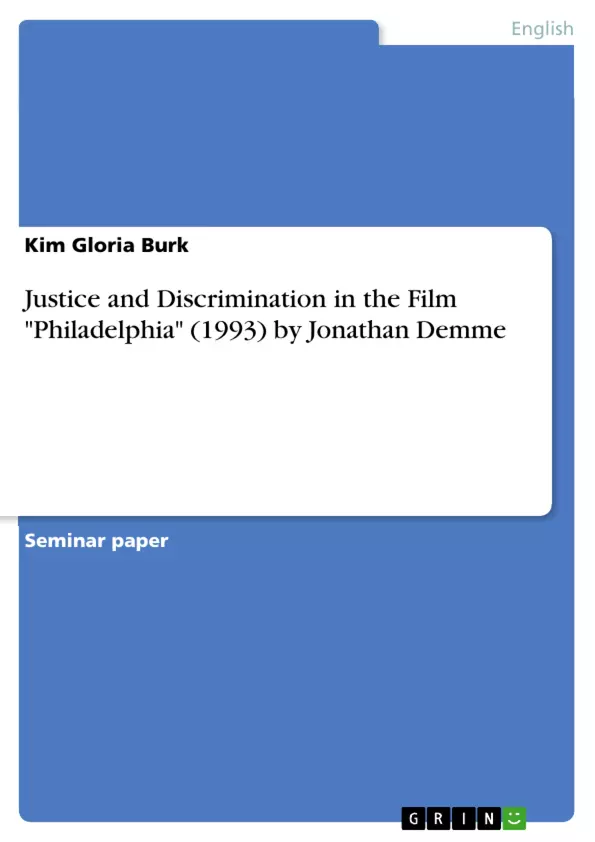This term paper deals with the severe aspects of justice and discrimination, which form a strong contrast in a case that seems to be hopeless. "No Justice! No Peace" describes the seedy atmosphere of Philadelphia that Andrew Beckett lives in. The young lawyer just got promoted but, when his senior partners of the prestigious law firm that he is working for, find out about his illness, he gets dismissed.
The film "Philadelphia" cannot be summed up within just one sentence because it combines several elements in one. Why is the film named after the city, and what could it reveal about the plot? After all, the sake of justice makes him win his case despite all controversies. Why is that so? How does director Jonathan Demme manage to present this within the film, and what speaks for the victim, Andrew Beckett? “No Justice! No Peace!" are the scratched words on elevator doors in one of the first scenes of the film, starting to be the first implication for his way of suffering in the city of Philadelphia. Does he find justice and peace after all?
Therefore, this term paper deals with the influence the protagonist receives in order to have faith in justice once again and how it is presented. Another important point is to focus on the aspect of discrimination toward people that are clearly categorised as other/different when compared to the average society. The film gives clear examples of daily struggles people with AIDS or homosexuals faced during the release of the film. Both central elements are combined and entwined during the courtroom scene, which forms the main part of this scientific work and focuses on the lawyer Joe Miller, who changes his homophobic attitude during the encounter with Andrew Beckett as his client. Relevant questions that occur are if society is primarily homophobic and if there is justice for people that acted rather reckless once than reasonable. The answers will be given through the context of the film and will reveal if "Philadelphia" proves to be the birthplace of the Declaration of Independence where All Men are Equal.
Inhaltsverzeichnis (Table of Contents)
- 1. Introduction
- 2. Philadelphia
- 2.1 Discrimination
- 2.2 Courtroom Scene
- 3. Conclusion
Zielsetzung und Themenschwerpunkte (Objectives and Key Themes)
This term paper examines the film Philadelphia, exploring its themes of justice, discrimination, and the portrayal of AIDS and homosexuality in the early 1990s. The paper focuses on the protagonist's journey towards finding faith in justice and how the film presents societal attitudes towards people with AIDS and homosexuals. It analyzes the courtroom scene, particularly the lawyer's transformation from homophobic to understanding, and investigates the question of whether justice is truly attainable for those who are perceived as "different" by society.
- The influence of societal prejudice on the protagonist's pursuit of justice
- The portrayal of discrimination against individuals with AIDS and homosexuals
- The impact of societal attitudes on the legal process
- The transformation of a character from homophobic to sympathetic
- The film's commentary on the social and legal realities of the early 1990s
Zusammenfassung der Kapitel (Chapter Summaries)
1. Introduction
The introduction provides an overview of the film's complex themes and introduces the main characters and their motivations. It highlights the film's depiction of discrimination against individuals with AIDS and homosexuals and sets the stage for examining the protagonist's search for justice.
2. Philadelphia
2.1 Discrimination
This section delves into the film's depiction of discrimination against individuals with AIDS and homosexuals. The narrative follows Andrew Beckett, a successful lawyer who is fired after developing Kaposi's sarcoma lesions on his face. The film explores the prejudice and fear surrounding AIDS and how it manifests in the workplace and society at large. The section examines the film's commentary on the social and legal realities of the early 1990s.
2.2 Courtroom Scene
This section focuses on the courtroom scene, which serves as a central point of examination for the paper. It analyzes the lawyer's transformation from homophobic to understanding as he confronts his own prejudices while representing Andrew Beckett. The section examines the complexities of the legal process and the challenges faced by those seeking justice against discrimination.
Schlüsselwörter (Keywords)
The main keywords and focus topics of the text include justice, discrimination, AIDS, homosexuality, prejudice, legal process, courtroom scene, social attitudes, transformation, and societal realities of the early 1990s.
Frequently Asked Questions
What are the main themes of the film "Philadelphia"?
The film primarily explores themes of justice, discrimination, and the societal stigma surrounding AIDS and homosexuality in the early 1990s.
How is discrimination portrayed in the movie?
Discrimination is shown through the character Andrew Beckett, a lawyer who is fired by his firm after his superiors discover he has AIDS, under the guise of professional incompetence.
What is the significance of the courtroom scene?
The courtroom scene is the climax where legal justice is sought. It also highlights the personal transformation of the lawyer Joe Miller, who overcomes his own homophobia while representing Beckett.
Why is the film named after the city of Philadelphia?
Philadelphia is known as the birthplace of the Declaration of Independence where "All Men are Equal." The film uses this setting to contrast the ideal of equality with the reality of discrimination.
Does Andrew Beckett find justice in the end?
Yes, despite the controversies and his failing health, Beckett wins his case, proving that justice is attainable even for those society perceives as "different."
- Citar trabajo
- Kim Gloria Burk (Autor), 2019, Justice and Discrimination in the Film "Philadelphia" (1993) by Jonathan Demme, Múnich, GRIN Verlag, https://www.grin.com/document/995130



